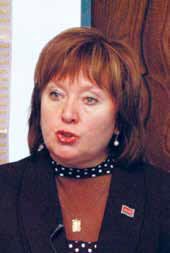Vitrenko Brings Warning
of Ukrainian Neo-Nazi Coup
to European Parliament
February 2014
 Natalia Vitrenko. |
Feb. 26, 2014 (EIRNS) -- Progressive Socialist Party of Ukraine leader Dr. Natalia Vitrenko and her delegation of fellow signers of the January 25 appeal by Ukrainian organizations for world leaders to intervene against a neo-Nazi coup in their country, today visited the European Parliament in Strasbourg. Vitrenko's remarks and question at a press conference given by European Parliament President Martin Schulz and Milos Zeman, President of the Czech Republic, covered by international media, put Schulz on record that the EU is negotiating with the fascist Svoboda party and prompted political reaction internationally.
At the press conference, on the occasion of Zeman's first speech at the Europarliament as Czech President, Vitrenko was called on first. As shown on Czech TV, she said: "I am Natalia Vitrenko, the leader of a left opposition party in Ukraine. I am the leader of a party, against which the Ukrainian Nazis have already begun witchhunts, for the purpose of physically eliminating me and the members of our party. Today in Ukraine, the offices of political parties are being burned on a mass scale, and employees in these offices are being killed. The homes of politicians who are disapproved of are being set on fire. Elected deputies of our legislature and local councils are getting beaten up, in order to make them carry out the demands of the terrorists and neo-Nazis of the Euromaidan's Right Sector. In effect, the neo-Nazis have established their regime."
Although Vitrenko had introduced herself as a politician, not a journalist, Schulz allowed her to ask one question, as a special exception in view of the circumstances in Ukraine today. Schulz also offered to meet Mrs. Vitrenko in a separate occasion.
Her question was, "Does Right Sector represent European values, and shouldn't neo-Nazi parties be banned in Ukraine?"
As reported by UNIAN, Zeman replied: "On both sides, there were not only peaceful demonstrators, but also radicals. There has been an escalation of political tension. I cannot exclude the possibility that some of the demonstrators were not only radical rightists, but pro-Nazi. In particular, supporters of Stepan Bandera. But I do not think they have the upper hand."
Schulz added: "The EU will do everything in its power to have a dialogue with all sides, in order to achieve the peaceful, stable and democratic development of Ukraine. My information is that even the members of Svoboda have been included in this dialogue. I have no comment on whether or not they are neo-Nazis. I think that you have made serious statements, and I shall check them. My sense is that we should draw everybody into the process, to find a solution to the crisis."
Schulz's statement prompted a reaction from Argiris Panagopoulos, a member of the European-side Tsipras slate at the coming elections for the European Parliament may 25. As reported in the Italian leftist daily Il Manifesto, Panagopoulos stated: "It is a shame to hear what Schulz said concerning a dialogue between the EU and the ukrainian neo-Nazists, not only because of the sufferings provoked by the Nazi in Ukraine itself, but also because of the fact that our Europe was born out of the Resistance and victory against those ones whom Schulz would like to invite to the dialogue. You don't dialogue with the Neo nazists, you dialogue with those who believe in democracy, solidarity and social justice, in Ukraine as well as in the rest of Europe'".
Vitrenko, together with labor activist Volodymyr Marchenko and head of the Kiev Rus Party Col. Valeri Sergachov, held their own well-attended press conference in Strasbourg later in the day. Their appearance, on the announced topic of "Ukraine: How to Avoid a Strategic Confrontation," was hosted by Italian Member of the European Parliament Claudio Morganti, of the Europe of Freedom and Democracy caucus in the EP. Vitrenko also was interviewed by three TV stations, including Euronews and Italy's Rai TV.
